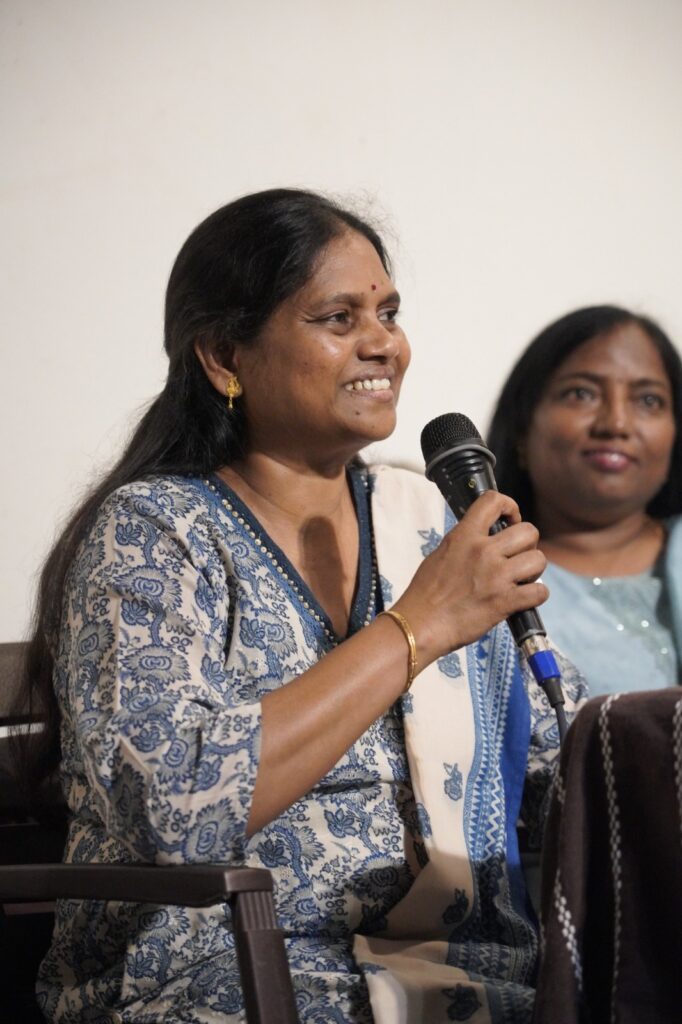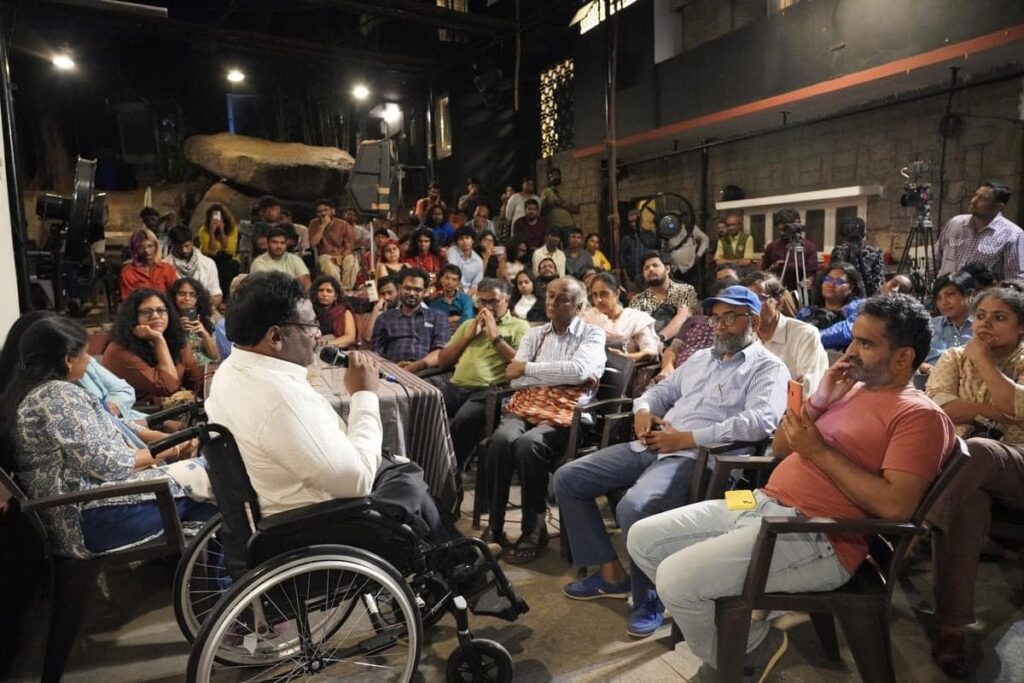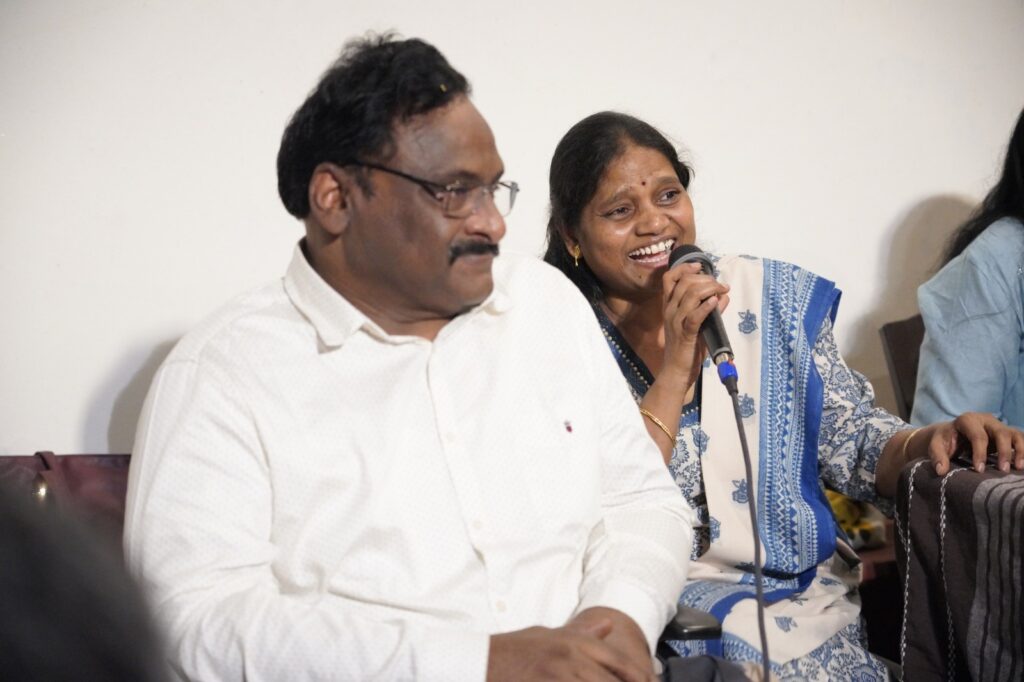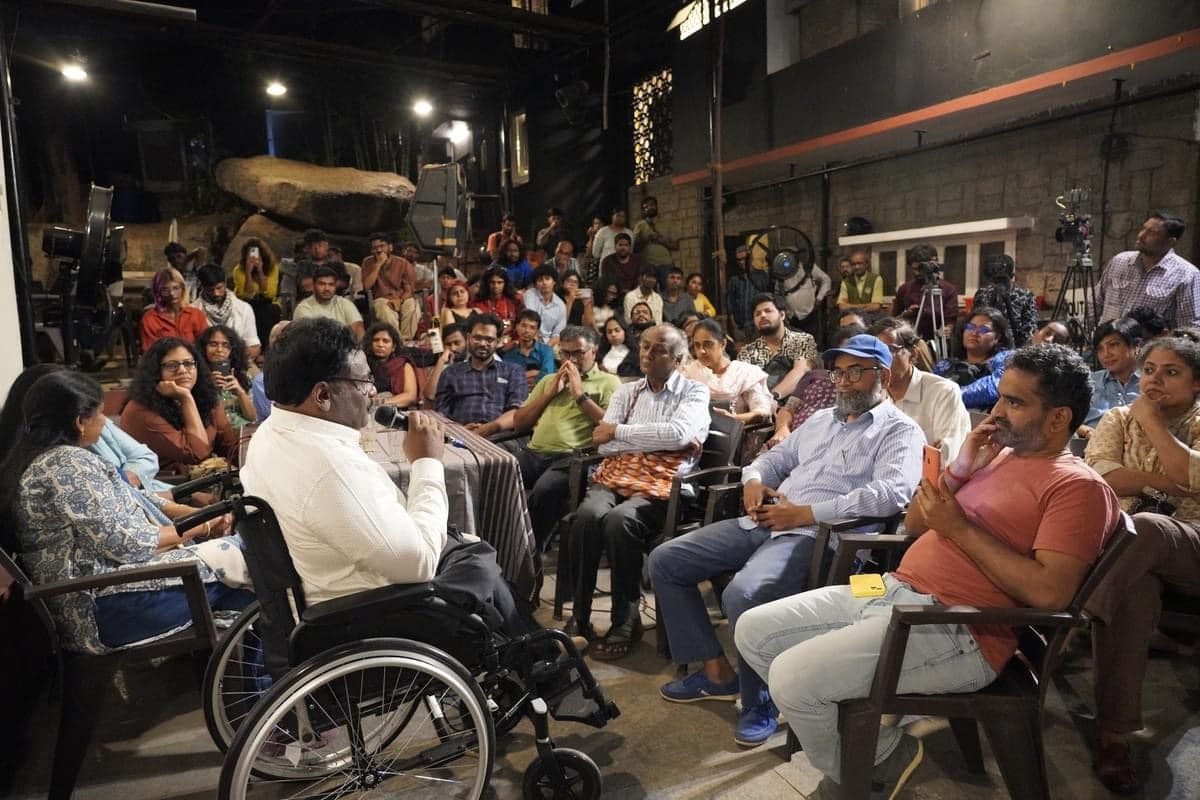10 years of wrongful confinement of Prof GN Saibaba in the infamous anda cell of Nagpur Central Jail – with no proper medication even – and here he is amidst us to tell the horror stories of state sponsored violence and atrocities on innocent undertrials in Indian jails
Written by Y Krishna Jyothi
A sense of restlessness pervaded Lamakaan, Hyderabad’s very own art and cultural space located in Banjara Hills, on Thursday night as the gathering—about 100 to 150 in number—waited with bated breath to meet the two special guests.
The visitors comprised people from various walks of life. While a significant portion of them were youngsters, a few had arrived from places as far away as Warangal to meet GN Saibaba and Vasantha Kumari for the first time.
Their faces lit up when the couple entered the premises, sporting wide smiles. A few friends and acquaintances hugged them warmly, recalling their good old times, while some writers offered them their latest works. Saibaba lovingly agreed to requests for selfies. It was a perfect “homecoming” that everyone had longed to host.

GN Saibaba was arrested by the Gadchiroli police in 2014 under the Unlawful Activities (Prevention) Act for his “alleged links to Maoists” and “waging war against India.” He was “wrongfully” incarcerated for 10 long years in the infamous anda cell of Nagpur Central Jail.
However, in March 2024, the Bombay High Court acquitted him of the charges and reversed the verdict given by the Gadchiroli Sessions Court in March 2017. While acquitting him, the Bombay High Court pointed out that the prosecution failed to establish legal seizure of material and could not prove that incriminating material was seized from the accused.
An English professor at Delhi University’s Ram Lal Anand College, Saibaba was suspended in 2014 after his arrest. He received half his salary until 2021 when the college terminated his services.
As the Bombay High Court noted in its verdict that their 10-year-long “struggle for justice was far from over,” Vasantha Kumari said it was only possible because of the unrelenting support from human rights activists, well-wishers, and an army of lawyers.
Aside from polio and pre-existing health conditions, wheelchair-bound Saibaba stepped out of the anda cell—after his acquittal—with new health issues like cysts in his brain, a lump in his stomach, pancreatic problems, kidney stones, severe spinal injury, etc.
Despite the court orders, Saibaba was not given the proper medical aid and assistance prescribed by the doctors. Their numerous pleas for medical bail and parole were outrightly turned down, citing the seriousness of the case. “My mother-in-law was my rock, and Sai was the apple of her eye. But he was denied bail even when she passed away,” Vasantha Kumari turned emotional, even as Saibaba stared blankly at the crowd.
“I saw a prisoner die right in front of my eyes due to a lack of treatment. I couldn’t put that emotion down on paper. It still feels like yesterday,” he said.

The Tiring Mulakats
Did you know? They have been friends since Class X. “I was never away from him until his arrest in 2014. These 10 years of separation felt like a life sentence for me. But I didn’t lose heart,” she said, with grit in her eyes. “The Mulakat sessions were truly tiring and rather depressing for me, though,” she admitted.
Vasantha Kumari was forced to wait from 8 a.m. to 12:30 p.m. on Mulakat days. “I was allowed to meet Sai only after the other visitors left the jail premises. I used to enter the prison with a lot of hope but returned home heavy-hearted, thinking I should never meet him again.”
She had many reasons to feel dispirited. After the exhausting wait, she was given only 15 minutes to talk to him. “The glass partition between us was so old that I could never catch a proper glimpse of him. His voice was all I had.”
And, of course, their conversation was always tracked. “Once, the prison officials demanded that I converse only in Hindi or English, instead of Telugu (since they couldn’t understand the language). I replied that I didn’t know either Hindi or English except my mother tongue. So, they didn’t allow me to meet Sai,” Vasantha Kumari recalled.
She continued, “I argued with them for about an hour, questioning why I couldn’t speak my mother tongue like the rest of the visitors. Finally, they agreed to Mulakat with a caveat: Sai would speak in English/Hindi, and I would respond in Telugu.”
Vasantha Kumari also shared another instance where the prison officials kept tabs on the books Saibaba was reading. “Books with ‘red’ covers gave them chills,” she guffawed, recalling the only fun part of the Mulakats.
Once, she was not allowed a Mulakat despite the court order and was told to go away. She managed to learn that the officials were taking Saibaba to a hospital for treatment. As she waited at the prison gate, she saw Saibaba being taken in a car amid heavy security.
“I barged into the convoy and started pounding on the car’s windows, screaming my lungs out. I didn’t think much but wanted to tell Sai that I had come for a Mulakat. As they didn’t stop the car, he told me to visit him at the government hospital. I ran after the speeding vehicle but in vain.”
By the time she reached the hospital, the paramilitary forces had terrorized the patients and their attendants. “They didn’t allow me to meet Sai. So, under the pretext of using the washroom, I managed to convey to him that I was in the hospital,” Vasantha Kumari recounted the harrowing experience.
“They silence our voices by creating terror. I always stepped out of the jail with 2,000 armed police personnel escorting me. That’s how fascism operates,” Saibaba quipped.
He also shared that he stepped out of the anda cell only for court trials and the “stage-managed treatment” at the government hospital, that too whenever the National Human Rights Commission or the UN intervened.
“In the name of medication, I was only given sleeping pills and Tramadol injections (for pain relief) all these 10 years. The officials shamelessly told the judge that it’s what they had in the prison.”

Life in Anda Cell
The former professor stated that he was “consciously silenced” in these 10 years. “In fact, I was warned nine months before my arrest to ‘mend my ways.’ I knew I had invited the wrath of the government with my activism. But I didn’t budge.”
It all started 35 years ago in his college days when GN Saibaba used to pose questions that made the authorities uncomfortable. “I was never arrested, though I took an active part in student movements and voiced concerns over the rights of Adivasis. However, my friends feared arrests when a crisis began in India in 2010, and the likes of Arundhati Roy predicted that this government would no longer allow us to question it.”
GN Saibaba continued, “Between 2010 and 2013, the NDA government signed hundreds of MoUs regarding mining projects in forest areas across India. When questioned, the officials said they were eliminating Naxals and ensuring development. But Naxals live only in some forest areas. These MoUs were signed at the cost of the livelihood of the local tribals. So, we mapped the areas and documented those agreements.”
A group of retired professors, IAS officers, judges, and other concerned citizens formed a group to bring these issues to the notice of the UN, NHRC, and other international agencies. Being the convenor, GN Saibaba was at the forefront and led the group in these discussions. “This didn’t go down well with the government, and I was warned to stop my activism. They threatened to implicate me in a false case and trouble me to an extent until I go silent.”
The day the Gadchiroli police raided Saibaba’s house, they seized his academic work, including answer sheets, research work, and proposals of MPhil and PhD students. However, they produced literature downloaded from a banned website as the ‘incriminating material seized’ from his house. Though his lawyers proved that the material was ‘planted,’ the government had other plans for him; he was incarcerated in the anda cell without trial.
The anda cell consists of 24 solitary confinement rooms designed to hold prisoners who behave violently, and that too after court orders. “But in my case, I was taken directly to the anda cell on day one. The jawans and staff were directed not to speak to me or come into my sight. The prison officials tried their best to break me, but I refused to die.” Shares GN Saibaba.
While solitary confinement was taking a toll on his health, he realized that most of the prisoners were languishing in jail without trials; a majority of them hailed from marginalized communities—minorities, SCs, and STs.
“Many were imprisoned in ‘fabricated cases’ like mine. One man was jailed for stealing a piece of bread and another for breaking the nameplate of a rich person. Others don’t even know why they were imprisoned. They landed there because of their social status and hunger.”
“I stepped into the jail with a lot of anger, having been targeted without fault. However, it gradually died down after learning the travails of my fellow prisoners. I realized that the only way to survive was to defeat those circumstances. So, I started teaching the SCs/STs and helping the prisoners in filing their petitions, secretly with the help of jawans. Further, I found solace in poetry. It helped me express myself to a large extent,” Saibaba explained.

The Fight Is Still On
The couple shifted to Hyderabad in 1991, soon after their marriage. Here, Vasantha Kumari worked with various women’s organizations and fought against dowry deaths, which were rampant in those days. “I actively participated in the anti-arrack movement and raised my voice against the atrocities faced by women under our NGO Mahila Chetana. Along with Sai, I too fought for the welfare of the tribals,” Vasantha Kumari said.
“These movements helped me gather the courage needed to fight for Sai’s acquittal and freedom. I realised what I was going through was nothing compared to what the displaced tribals, helpless women, and prisoners tolerate every day. What initially started for Sai has now turned into a fight to save every innocent person from languishing in jail,” she added.
“State-sponsored violence continues to claim the lives and livelihood of lakhs of innocent people across India, particularly Adivasis. They need us to be their voices, raise their issues, and question the governments. So, the fight is still on. We won’t stop questioning, come what may,” Saibaba and Vasantha Kumari declared, amid claps and cheers.
Pictures by Charan Dontham












